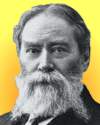 (source)
(source)
|
James Russell Lowell
(22 Feb 1819 - 12 Aug 1891)
American poet and satirist whose first of several collections of poems was A Year’s Life (1841). He also published a number of literary essays, political pamphlets, and satirical works, such as The Biglow Papers, a series of satirical verses written in opposition to the Mexican War. He was an ardent abolitionist.
|
Science Quotes by James Russell Lowell (10 quotes)
A man does not receive the statements that “two and two make four,” and that “the pure in heart shall see God,” on the same terms. The one can be proved to him with four grains of corn.
— James Russell Lowell
In 'Dante', The Writings of James Russell Lowell: Literary Essays (1890), 255.
He who first stretched his nerves of subtile wire
Over the land and through the sea-depths still,
Thought only of the flame-winged messenger
As a dull drudge that should encircle earth
With sordid messages of Trade…
Over the land and through the sea-depths still,
Thought only of the flame-winged messenger
As a dull drudge that should encircle earth
With sordid messages of Trade…
— James Russell Lowell
Poem 'Science and Poetry', collected in The Poetical Works of James Russell (1848, 1897), 475.
In the earliest ages science was poetry, as in the latter poetry has become science.
— James Russell Lowell
In literary essay, 'Witchcraft' (1868), collected in The Writings of James Russell Lowell in Prose and Poetry (1870, 1898), Vol. 2, 359.
Some filosifers think that a fakkilty’s granted
The minnit it’s felt to be thoroughly wanted.…
That the fears of a monkey whose holt chanced to fail
Drawed the vertibry out to a prehensile tail.
The minnit it’s felt to be thoroughly wanted.…
That the fears of a monkey whose holt chanced to fail
Drawed the vertibry out to a prehensile tail.
— James Russell Lowell
Satire, from 'Biglow Papers', as quoted in Horatio Hackett Newman (ed.), Readings in Evolution, Genetics, and Eugenics (1921), 330.
The beauty of his better self lives on
In minds he touched with fire, in many an eye
He trained to Truth’s exact severity;
He was a teacher: why be grieved for him
Whose living word still stimulates the air?
In minds he touched with fire, in many an eye
He trained to Truth’s exact severity;
He was a teacher: why be grieved for him
Whose living word still stimulates the air?
— James Russell Lowell
[On Jean Louis Rodolphe Agassiz.] 'Ode on the Death of Agassiz' (1888). In The Poetical Works of James Russell Lowell (1978),381.
The electric nerve, whose instantaneous thrill
Makes next-door gossips of the antipodes…
Makes next-door gossips of the antipodes…
— James Russell Lowell
Poem 'Science and Poetry', collected in The Poetical Works of James Russell (1848, 1897), 437.
The pressure of public opinion is like the pressure of the atmosphere; you can’t see it-but, all the same, it is sixteen pounds to the square inch.
— James Russell Lowell
As quoted in Brander Matthews, 'Unfamiliar Quotation', New York Times Book Review and Magazine (2 Apr 1922), 2. Matthews states “I am not certain that I can repeat it [as given above] in his exact words, but it is to this effect. … That sentence was minted by Lowell beyond all question. … I can recall where I got it. Nearly forty years ago … he was visited by Julian Hawthorne [who] wrote a long report” which included “good things” from his conversation with Lowell. The above quote was one of Lowell’s utterances.
There is surely room for yet another schoolmaster when a score of seers advertise themselves in Boston newspapers.
— James Russell Lowell
In literary essay, 'Witchcraft' (1868), collected in The Writings of James Russell Lowell in Prose and Poetry (1870, 1898), Vol. 2, 397.
Truth forever on the scaffold, Wrong forever on the throne,—
Yet that scaffold sways the Future, and, behind the dim unknown,
Standeth God within the shadow, keeping watch above his own.
Yet that scaffold sways the Future, and, behind the dim unknown,
Standeth God within the shadow, keeping watch above his own.
— James Russell Lowell
'The Present Crisis', The poetical works of James R. Lowell (1858), 161.
We cannot but think there is something like a fallacy in Mr. Buckle’s theory that the advance of mankind is necessarily in the direction of science, and not in that of morals.
— James Russell Lowell
In 'Dante', The Writings of James Russell Lowell: Literary Essays (1890), 254. [The reclusive Henry Thomas Buckle (1821-1862) began writing his History of Civilization, trying to construct a science of society on the basis of inductions from history. —Webmaster]
See also:
- The Complete Poetical Works of James Russell Lowell, by James Russell Lowell. - book suggestion.
- BooklistBooks by James Russell Lowell.
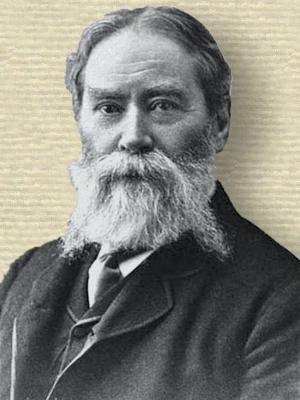
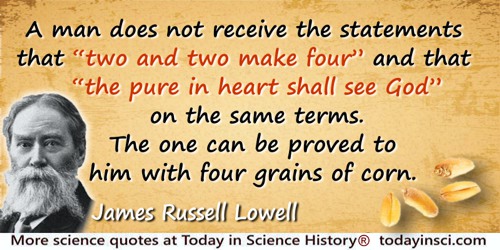
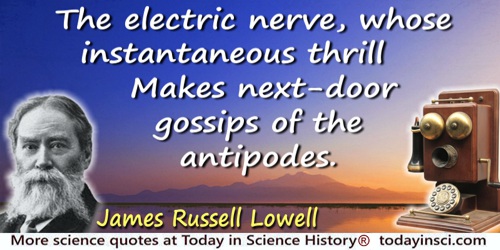
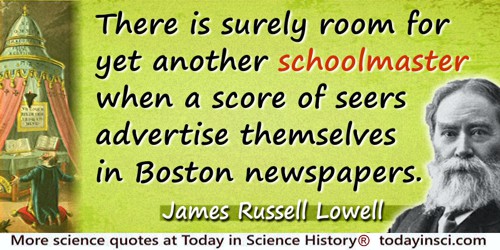
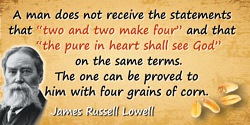
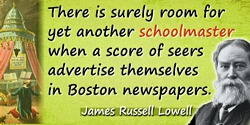
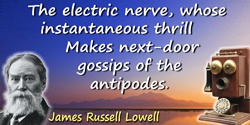
 In science it often happens that scientists say, 'You know that's a really good argument; my position is mistaken,' and then they would actually change their minds and you never hear that old view from them again. They really do it. It doesn't happen as often as it should, because scientists are human and change is sometimes painful. But it happens every day. I cannot recall the last time something like that happened in politics or religion.
(1987) --
In science it often happens that scientists say, 'You know that's a really good argument; my position is mistaken,' and then they would actually change their minds and you never hear that old view from them again. They really do it. It doesn't happen as often as it should, because scientists are human and change is sometimes painful. But it happens every day. I cannot recall the last time something like that happened in politics or religion.
(1987) -- 


